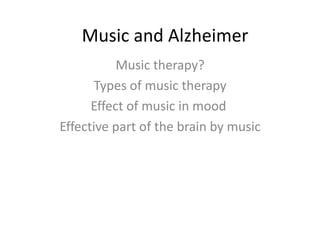
Music brain
- 1. Music and Alzheimer Music therapy? Types of music therapy Effect of music in mood Effective part of the brain by music
- 2. Have you ever used music at work to jack up productivity or change your mood? Interestingly some rhythms. such as baroque, induce enzymes in the brain and add amazing well being and focus. Other tunes leave you punchy … and unable to focus. Has it happened to you?
- 4. Music to Change Your Brain uses clinically proven audio technology to help you experience: Relaxation (Alpha Waves)—relax your body, quiet your mind, and renew your spirit. Healing (Mixed Waves with Delta Peaks)—tap into your own natural source of healing and rejuvenation. Creativity (Theta Waves)—spark insight and vision, and discover new realms of creativity. Awakening (Beta, Alpha, Theta & Delta Waves)—explore your potential as you open up to higher states of consciousness. Meditation (Gamma Waves)—experience expanded awareness and deep meditative states. 10:06 min. Sleep (Delta Waves)—Fall asleep easily and naturally, and wake up refreshed.
- 5. Listening to, playing, reading and creating music involves practically every part of the brain. In the book This Is Your Brain on Music, Daniel J. Levitin explains that listening to music first involves subcortical structures like cochlear nuclei, the brain stem, and the cerebellum. It then moves up to auditory cortices on both sides of the brain. And when you hear music, listening also involves the memory centers in the brain, such as the hippocampus and lowest parts of the frontal lobe. Tapping along with the music gets your cerebellum involved. Reading music involves the visual cortex, and listening to or recalling lyrics will involve language centers in the temporal and frontal lobes. - See more at: http://brainworldmagazine.com/music-rhythm-and-thebrain/#sthash.mWwLSIiL.dpuf
- 6. If you actually perform music, your frontal lobe for planning, and your motor and sensory cortex will activate as well. Because playing music requires coordination of motor control, somatosensory touch and auditory information, most musicians are known to have developed a greater ability than the average person to use both hands. Increased networks between the left and right brain form thick fibers that interconnect the two motor areas, an area that is larger in musicians than in nonmusicians. -
- 7. __ Because the brain has the capacity to change (called neuroplasticity), music also affects some of the brain’s learning capacities, increasing the size of the auditory and motor cortex. A research team from Utrecht University in the Netherlands also found music is associated with an improved ability for auditory imagery. Musically trained groups performed better on both a musical imagery task and a non-musical auditoryimagery task than naive groups.
- 8. Generally music has been regarded as a right-brain activity because of its reliance on creativity. But brain-imaging research has shown music does involve both hemispheres, although a majority of activity does occur in the right side of the brain. Maurice Ravel (1875-1937) was a French impressionist composer who suffered from an unknown disease that affected his left hemisphere, leaving him unable to speak, perform complex tasks, or read and write. He also lost his musical function and could not compose during the last years of his life. In contrast to Ravel, Russian composer Shebalin and British composer Benjamin Britten both continued writing musical works although they experienced impairment to their spoken language after having sustained strokes in the left hemisphere.
- 9. Music Affects Emotion, Involves a Deep Level of Our Brain, and Helps Us Heal - See more at: http://brainworldmagazine.com/m usic-rhythm-and-thebrain/#sthash.mWwLSIiL.dpuf
- 10. lthough music involves many areas of the brain, people listen to or play music because they like it. Research also indicates that people value music primarily because of the emotions it evokes. __ In addition to a cognitive appraisal, Dr. Juslin and his team at Uppsala University, Sweden, suggested underlying mechanisms that could explain why listening to music may induce emotions, involving reflexes, conditioning, emotional contagion, visual imagery, memory and expectancy. __ At deeper level, music stimulates activities of the amygdala, which regulates emotion, and even the brain stem, which is the center for many of the vital functions of our bodies such as breathing, heart rate and digestion. - See more at: http://brainworldmagazine.com/musicrhythm-and-the-brain/#sthash.mWwLSIiL.dpuf
- 12. 1. Music Therapy provides positive changes in mood and emotional status. 2. Music captivates and maintains attention - it stimulates parts of the brain. 3. Music and the silence within it, provides non-verbal, immediate feedback. 4. Music is where people of all levels can participate. 5. Music is easily adapted to and can be reflective of a person’s abilities. 6. Music provides a meaningful, enjoyable context for repetition. 7. Music provides a social context – it sets up a safe, structured setting for verbal 8. And non-verbal communication. 9. Music provides an effective memory aid. Imbalance created by action and passion, outer and inner events result in stress. The cause is not far to seek.
- 13. Music lights up almost every area of the brain, which shouldn’t be a surprise since it makes people tap their feet, encourages the recollection of vivid memories and has the potential to lighten the mood.
Hinweis der Redaktion
- http://brainworldmagazine.com/music-rhythm-and-the-brain/
